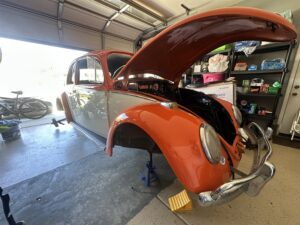
This 1966 Volkswagen Beetle VIN Verification was done by our team member in Beaumont, Ca. on a 8-19-2025

This 1966 Volkswagen Beetle VIN Verification was done by our team member in Beaumont, Ca. on a 8-19-2025
The 1966 Volkswagen Beetle is one of the most recognizable and beloved cars of the 20th century. By the mid-1960s, the Beetle had firmly established itself as a cultural icon thanks to its affordability, reliability, and distinctive design. The 1966 model year is especially notable because it introduced several upgrades in performance and comfort while maintaining the simple, classic styling that made the Beetle a worldwide success.
The Volkswagen Beetle was originally conceived in the 1930s under Ferdinand Porsche’s design direction, with mass production beginning in 1945 after World War II. By 1966, the Beetle had become one of the best-selling cars globally, with production facilities expanding outside Germany to meet demand. The 1966 model year represented a transitional point in Beetle history, as Volkswagen updated the car with a larger engine and mechanical refinements, making it more capable on modern highways while still keeping the car’s trademark charm and economy.
The 1966 Beetle received a notable power upgrade. For the first time, it was fitted with a 1300cc (1.3L) flat-four air-cooled engine producing 50 horsepower, compared to the 40-hp 1200cc engine in prior years. This bump in power gave the Beetle better highway performance, improved acceleration, and the ability to keep up with faster traffic of the era. The rear-mounted, air-cooled design was both simple and reliable, requiring minimal maintenance. It was paired with a 4-speed manual transmission, driving the rear wheels.
Exterior: The 1966 Beetle retained its familiar rounded body, oval fenders, and chrome accents. Subtle differences distinguished it from earlier models, including slightly larger headlamps and improved bumpers.
Interior: The cabin remained minimalist but functional, featuring a new flat-style steering wheel, more comfortable seats, and improved heating.
Dimensions: Compact and lightweight, the Beetle was easy to maneuver in crowded cities while also being practical with its front trunk and rear parcel shelf.
The 1966 Volkswagen Beetle was primarily offered as:
Two-Door Sedan (standard hardtop)
Convertible Cabriolet (built by Karmann, more luxurious and stylish)
Buyers could add optional features such as a radio, whitewall tires, or upgraded upholstery.
Safety features were still basic compared to modern standards. The Beetle came with lap seatbelts, padded dashboard elements, and safety glass. The rear-engine layout offered good traction, though handling at high speeds could feel unstable. Simplicity and reliability were key selling points, and the 1966 model was considered sturdier than many small cars of the era.
The 1966 Beetle was highly fuel-efficient for its time, averaging 25–30 miles per gallon, depending on driving conditions. Its lightweight build and small displacement engine made it an economical choice, especially during a period when fuel costs were beginning to rise.
In 1966, the Beetle competed against compact cars such as the Ford Falcon, Chevrolet Corvair, and Austin Mini. While competitors offered more power or modern styling, none could match the Beetle’s combination of affordability, reliability, and global reputation. Its resale value and loyal customer base kept it ahead of rivals.
When new, the 1966 Volkswagen Beetle Sedan was priced at around $1,650–$1,800 USD, while the Convertible cost closer to $2,000 USD. Today, classic car collectors prize the ’66 model for its reliability and the introduction of the 1300cc engine. Depending on condition, restored examples can fetch $12,000–$30,000+ on the collector market.
By 1966, the Beetle had already achieved global recognition as the world’s best-selling import in the United States.
Its reputation for durability and quirky design earned it a devoted following, eventually cementing it as a symbol of the 1960s counterculture movement.
Many enthusiasts consider the 1966 model a “sweet spot” for Beetle ownership—modern enough to be practical, yet still retaining the classic early-Beetle look.
Need a VIN Verification? We are licensed to complete the REG 31 form. Call to get your car, truck or motorcycle verified today!
© 2025 QUICK VIN VERIFICATION. All rights reserved.